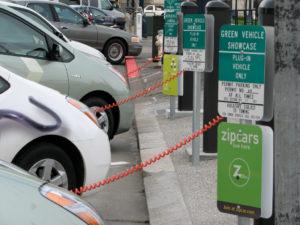
According to the report “EU Reference Scenario 2016 – Energy, transport and GHG emissions – Trends to 2050” energy efficiency improvements are expected to be driven especially by policy up to 2020 and then by market/technology trends post-2020.
Three converted Prius Plug-In Hybrids charging at San Francisco City Hall
Three converted Prius Plug-In Hybrids charging at San Francisco City Hall
Transport activity shows significant growth, with the highest increase during 2010- 2030, driven by developments in economic activity. The decoupling between energy consumption and activity is projected to continue and even to intensify in the future.
For the CO2 standards for cars and vans, it is assumed, based on current reduction trends, that the 2020/21 CO2 targets for the fleet of new vehicles set out in the Regulations will be achieved and remain constant afterwards.
Marketing vehicles equipped with hybrid system on their power train will become more appealing to consumers thanks also to their lower additional costs.
In addition electrically chargeable vehicles (EVs) will emerge around 2020 as a result of EU and national policies as well as incentive schemes aiming to boost their penetration. Strong incentives as for instance tax exemption or subsidization will make their acquisition more attractive to the market segment of urban commuters and the early adopters.
Plug-in Hybrid Electric Vehicles (PHEVs), equipped with an internal combustion engine, will not pose range limitations to the travelers and will be relatively less capital intensive than Battery Electric Vehicles (BEVs).
Complementary, the Directive on alternative fuels infrastructure will support the uptake of other alternative fuels (e.g. liquefied natural gas in road freight and shipping) in the Reference Scenario.
More generally, all policies already adopted can have long-lasting implications, such as for instance the influence of the CO2 for cars and vans Regulations on the EU vehicle fleet characteristics.